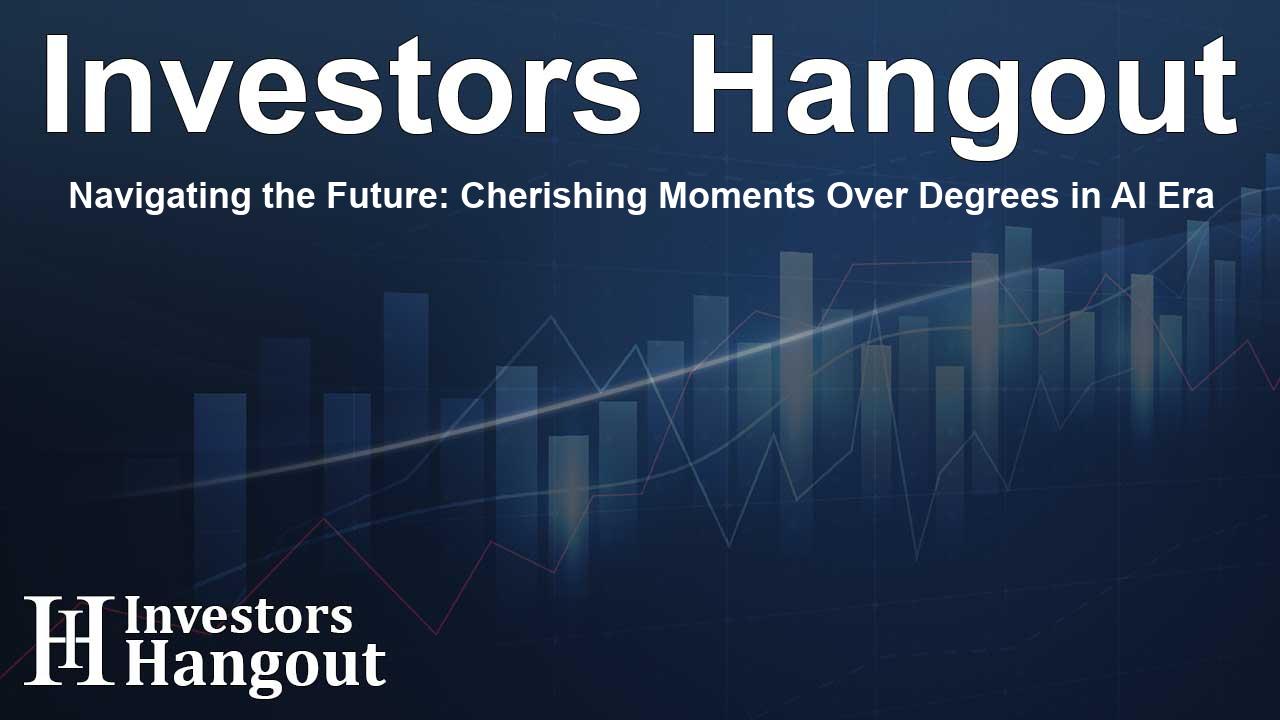Navigating the Future: Cherishing Moments Over Degrees in AI Era

Embracing a New Perspective in Education
Jad Tarifi, a leading figure in Google's generative AI team, is advocating for a shift in how we perceive education and career paths in the face of rapid technological advancements. His insightful thoughts suggest that pursuing lengthy academic degrees, particularly in fields like law and medicine, may not be the best choice in today's fast-evolving landscape.
AI Disruption and Rising Educational Risks
In a revealing discussion, Tarifi emphasized that by the time individuals finish a Ph.D., the landscape of artificial intelligence will be fundamentally altered. He expressed that traditional educational paths could lead to wasted time and effort, particularly in fields that are quickly evolving, like AI. “AI itself is going to be gone by the time you finish a Ph.D.,” he said, pointing out the pacing at which innovation is occurring.
Academic Paths Require Deep Passion
Tarifi, who launched his career at Google nearly a decade ago before founding Integral AI, stated that a Ph.D. should only be pursued by those who are truly passionate about their field. He remarked that entering a lengthy academic program without such passion could be an exhausting ordeal that ultimately yields little reward.
Engagement with the World Above All Else
Urging a break from traditional academic routes, he championed the idea of engaging with the world directly, advocating for experiential learning over rote memorization. “If you are unsure, you should definitely default to ‘no,’ and focus on just living in the world,” he advised, emphasizing that life experience will yield faster and more meaningful learning.
Concerns Regarding Traditional Professions
Tarifi's thoughts extend not only to higher education but also to professions like law and medicine. He highlighted that current medical education remains outdated, often reliant on memorization rather than practical, adaptable skills. This notion presents a valid concern about the relevance of such training in a rapidly evolving environment.
Debate on AI's Influence on Employment
As more experts join the conversation, the fear surrounding AI displacing jobs intensifies. Former Google X business officer Mo Gawdat recently remarked that the belief AI will create jobs amidst its replacement of mundane tasks is misguided. He warned that even high-tier positions could be at risk when artificial general intelligence is implemented widely.
Soft Skills: The New Currency of Value
In this changing landscape, Tarifi believes soft skills will become paramount. Emphasizing the importance of self-awareness, emotional intelligence, and interpersonal relationships, he argues that qualities like empathy and good communication will be essential in utilizing AI effectively. According to him, as the technical prowess of AI grows, human aspects will differentiate individuals in the workforce.
Learning Beyond the Technical Sphere
Tarifi illustrates that deep technical knowledge is not the sole path to contributing value in an AI-driven future. He noted, “I have a Ph.D. in AI, but I don’t know how the latest microprocessor works.” This perspective encourages individuals to gain skills applicable in real-life situations rather than becoming mired in technical specifics.
Fostering a Balanced Life amid Technological Advances
As the dialogue surrounding AI and education continues, Tarifi reiterates the importance of building a well-rounded life. He stresses engaging in mindfulness practices, socializing, and gaining a deeper understanding of oneself as vital components to thriving personally and professionally. “Prompting and using AI well requires more than just technical skills; it’s about being emotionally aware and discerning,” Tarifi concluded.
Frequently Asked Questions
What is Jad Tarifi’s main argument about traditional education?
Tarifi argues that lengthy academic paths like law and medicine aren't the best choices in today's rapidly changing AI landscape, advocating for immediate engagement with the world instead.
Why does Tarifi believe pursuing a Ph.D. should be passion-driven?
He believes that only individuals who are truly passionate about their subject should pursue a Ph.D. to avoid the painful sacrifices involved in such a long program.
How does Tarifi view AI's impact on jobs?
He raises concerns that AI may replace even high-level jobs, suggesting that individuals adapt to use AI rather than viewing it as a tool that solely creates job opportunities.
What skills does Tarifi recommend fostering in this new environment?
Tarifi emphasizes the importance of soft skills such as emotional intelligence, communication, and personal growth, which he believes will differentiate individuals in AI-integrated workplaces.
How can someone contribute value in the AI era without technical skills?
According to Tarifi, individuals can rely on their ability to understand human emotions and socially navigate technology, even without knowing all the technical details about it.
About The Author
Contact Logan Wright privately here. Or send an email with ATTN: Logan Wright as the subject to contact@investorshangout.com.
About Investors Hangout
Investors Hangout is a leading online stock forum for financial discussion and learning, offering a wide range of free tools and resources. It draws in traders of all levels, who exchange market knowledge, investigate trading tactics, and keep an eye on industry developments in real time. Featuring financial articles, stock message boards, quotes, charts, company profiles, and live news updates. Through cooperative learning and a wealth of informational resources, it helps users from novices creating their first portfolios to experts honing their techniques. Join Investors Hangout today: https://investorshangout.com/
The content of this article is based on factual, publicly available information and does not represent legal, financial, or investment advice. Investors Hangout does not offer financial advice, and the author is not a licensed financial advisor. Consult a qualified advisor before making any financial or investment decisions based on this article. This article should not be considered advice to purchase, sell, or hold any securities or other investments. If any of the material provided here is inaccurate, please contact us for corrections.
